Best-Tested Compression Socks
Bombas Performance Compression Socks
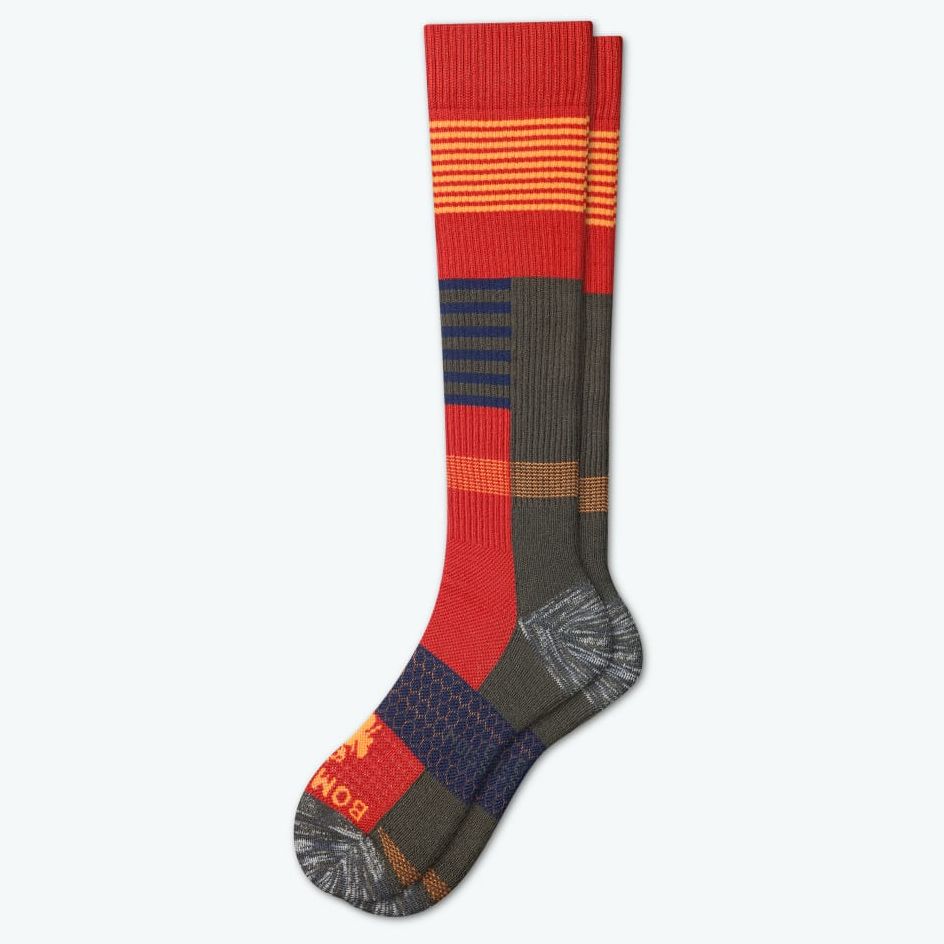
Best-Tested Compression Socks
Bombas Performance Compression Socks
Pros
- Available in multiple mmHg levels (tightnesses)
- Unique colors and patterns
- Signature Honeycomb arch support
Cons
- At more than $35/pair, they’re pricey
From the same brand that we deemed had the “Best Ankle Socks,” Bombas also makes a compression sock that we consider our all-time favorite. The model featured here offers 20-30 mmHg of compression but also comes in a more moderate 15-20 mmHg version. The elastic stays in tip-top shape, and the sock conforms tightly to your foot through dozens of washes.
The pair also features the brand’s signature Honeycomb arch support, which we feel is especially effective for performance purposes. In these socks, you’ll feel lifted and supported underfoot with that *just right* level of compression through the ankle and lower leg. Not to mention, they crush it on style, available in all types of unique colors and patterns.
Read more: Bombas Socks Review
| Compression level | Strong |
|---|---|
| Cut | Knee-high |
| Material | 73% Polyester 12% nylon 9% elastane 6% cotton |
| Fits shoe sizes | 6 – 16 |
Best Compression Ankle Socks
Silver Antimicrobial No-Show Compression-Fit Running Socks
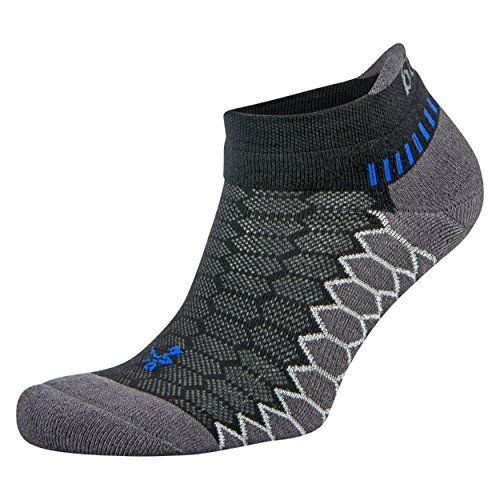
Best Compression Ankle Socks
Silver Antimicrobial No-Show Compression-Fit Running Socks
Pros
- Incredibly affordable
- Several colors and patterns available
- Over 8,000 five-star Amazon reviews
Cons
- Doesn’t provide enough compression for some
Not all compression socks are designed to be pulled over your calves. There are low-cut, no-show socks with compression, too. The silhouette intentionally mimics the shape of a running shoe, with compressive support through the arch and a snug fit.
Unlike some ankle socks that can constantly roll down at the heel as you run, these stay right where you want them. With slightly tighter compression at the ankle, a heel tab that makes them easy to pull on, and bacteria-fighting silver woven into the fabric, they’re just as comfortable as they are functional.
Read more: Best Socks on Amazon
| Compression level | Light |
|---|---|
| Cut | Ankle |
| Material | 75% Drynamix® 23% nylon 2% elastane |
| Fits shoe sizes | 4.5 – 14 |
Best Compression Socks for Running
Lululemon MicroPillow Compression Knee-High Running Socks
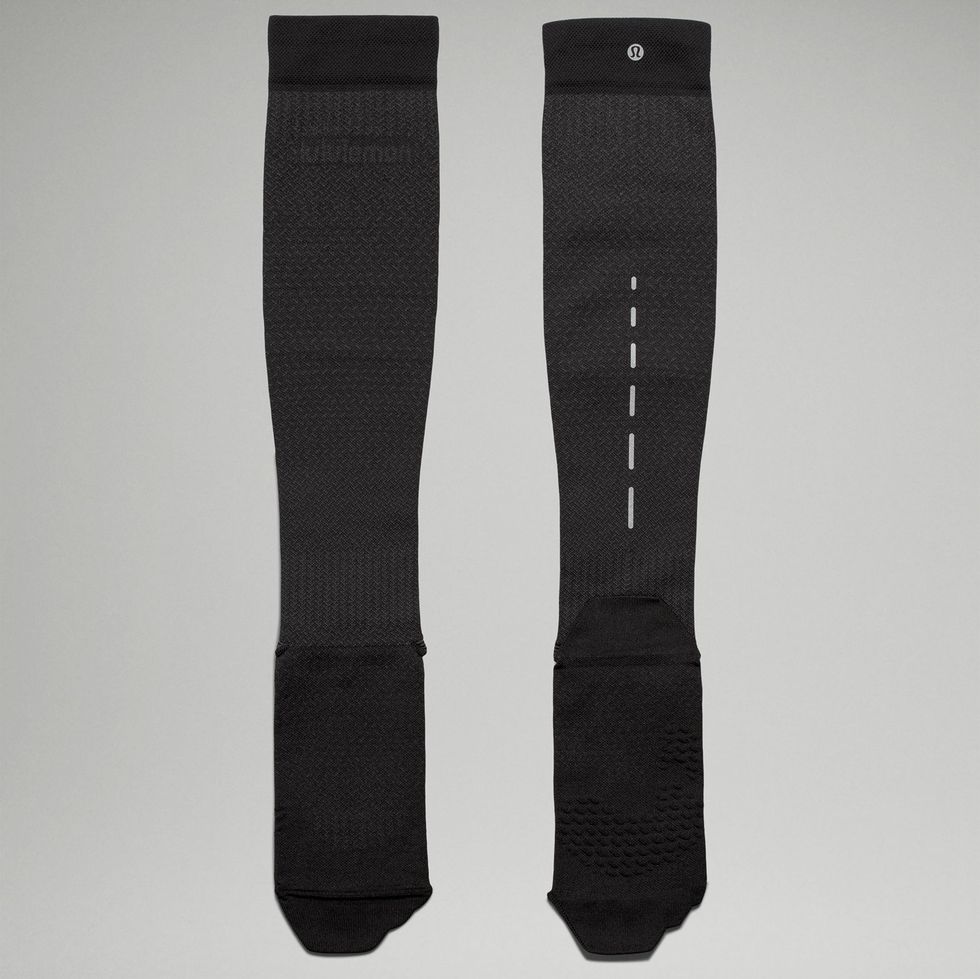
Best Compression Socks for Running
Lululemon MicroPillow Compression Knee-High Running Socks
Pros
- Incredibly breathable
- Light compression best suited for running
- Comfortable fit
These knee-high socks have a low-grade compression level that’s made for long-distance running. They aren’t the most snug-fitting compression socks you’ll find on this list, but they do provide the ideal amount of squeeze to your feet and calves to ensure proper blood flow during your running sessions.
They’ve got the true essence of Lululemon, too. The material feels luxe, ultra-comfortable, incredibly breathable, and lightweight. Plus, we just really think we look cool running in these puppies. The only downside? They’re a little pricey at almost $40 per pair.
| Compression level | Medium |
|---|---|
| Cut | Knee-high |
| Material | 93% Nylon, 7% Elastane |
| Fits shoe sizes | 6 -14 |
Advertisement – Continue Reading Below
Best-Looking Compression Socks
Comrad Socks Recovery Knee High Compression Socks
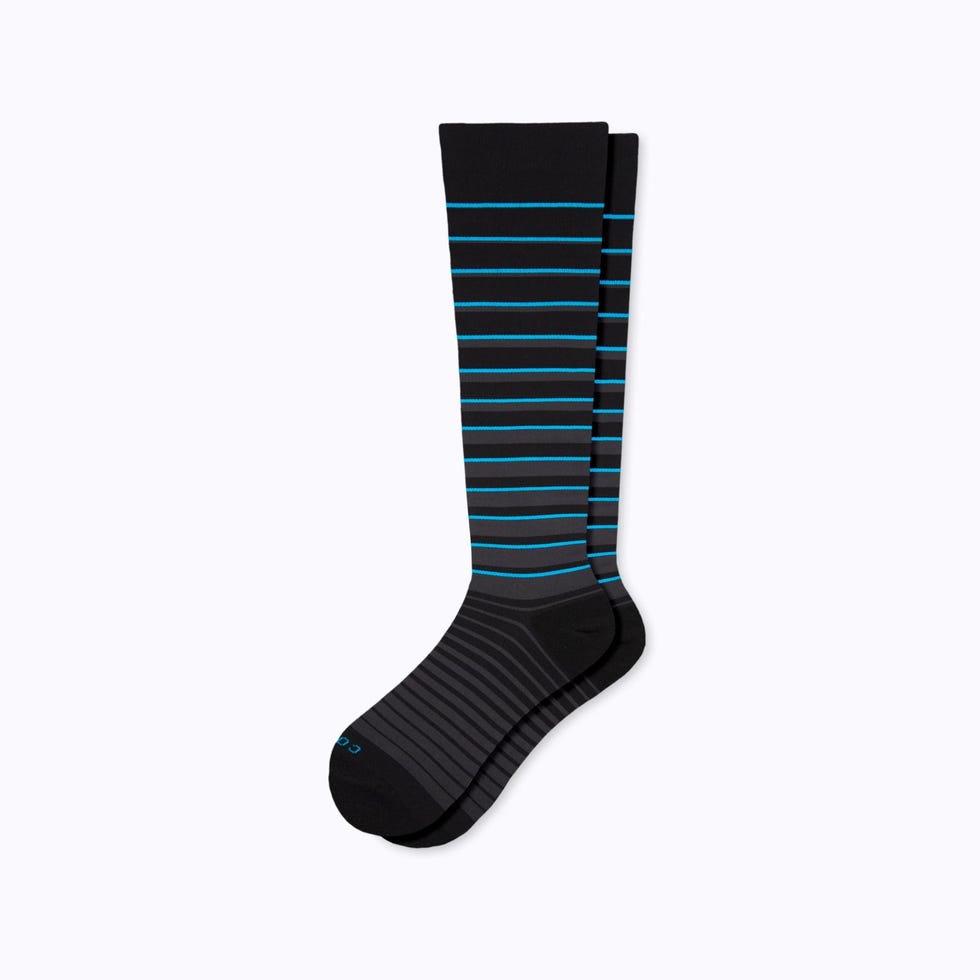
Best-Looking Compression Socks
Comrad Socks Recovery Knee High Compression Socks
Pros
- Good-looking
- Ideal mid-range level of compression
- Soft yet durable fabric
- Available in wide sizes
If you aren’t familiar with Comrad Socks already, that’s ok. Introducing our editors’ most celebrated sock from the brand: The Recovery Knee High Compression Socks. The material looks and feels like a nice dress sock you’d sport to the office with nice slacks or a suit, and the compression sort of sneaks in under the radar (AKA without that stereotypical, full-on orthopedic compression sock look).
The compression isn’t anything to underestimate, either. We found these to provide a really comfortable yet effective mid-range squeeze, which is less tight than the Bombas Performance Compression Socks but snugger than the Lululemon model listed above.
| Compression level | Medium |
|---|---|
| Cut | Knee-high |
| Material | 36% Emana infrared nylon, nylon 56%, 8% elastane |
| Fits shoe sizes | 6 – 13 (including wide) |
Best Merino Wool Compression Socks
Smartwool Hunt Classic Edition Over the Calf Socks
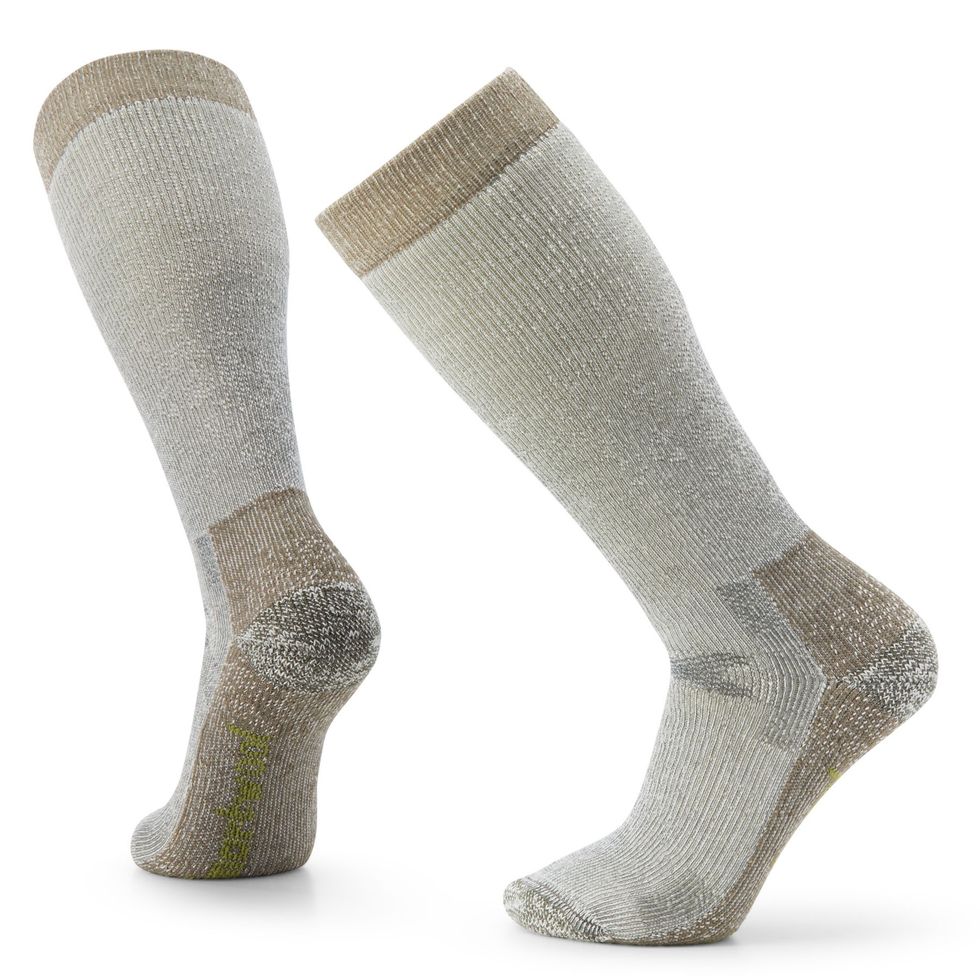
Best Merino Wool Compression Socks
Smartwool Hunt Classic Edition Over the Calf Socks
Pros
- Super soft
- Temperature-regulating
- Cushioned comfort through the arch and heel
- Graduated compression
Cons
- May feel too tight through the ankle for some
These are the socks cold weather sport fanatics should all know and love. They pack some cushion underfoot that feels equally supportive and cloud-like. But the best part? They’re made from merino wool, a natural material with temperature-regulating properties.
Ok, maybe we lied. The best part might actually be the 20-30 mmHg thoughtfully graduated compression, which adds comfort and better encourages blood flow back to the heart. We were also won over by the incredible softness.
Read more: Best Moisture-wicking Socks
| Compression level | Heavy |
|---|---|
| Cut | Mid-calf |
| Material | 73% Merino Wool 9% Nylon 17% Recycled Nylon 1% Elastane |
| Fits shoe sizes | 6 – 14.5 |
Most Comfortable Compression Socks
Tracksmith Speed Crew Sock
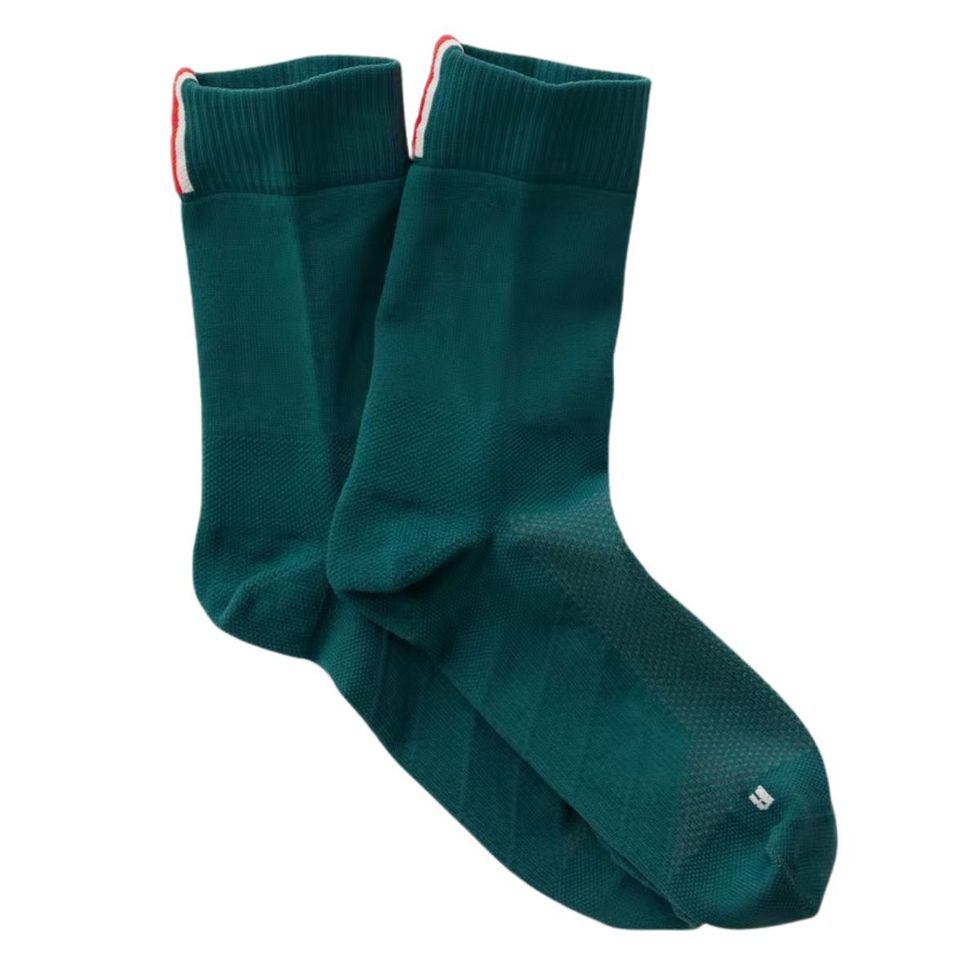
Most Comfortable Compression Socks
Tracksmith Speed Crew Sock
Pros
- Light compression best suited for running
- Timeless style
- High breathability
Cons
- Not suitable for significant lower leg compression
- Limited larger sizes available
Similar to Lululemon’s compression sock, the Speed Crew is made from a light compression blend that feels just perfect for running. The pair features reinforced micro cushioning in the heel and Achilles, which we noticed helps prevent chaffing and added compression through the arch which offers a little extra lift.
In terms of style, we love the timeless, low-profile design and that you’d never know they’re compression socks at first glance. They come in a few eye-catching colors, but we think this rich blueish green looks coolest in person.
| Compression level | Light |
|---|---|
| Cut | Crew |
| Material | 95% Polyamide, 5% elastane |
| Fits shoe sizes | 4 – 12 |
Advertisement – Continue Reading Below
Best Compression Socks for Skiing
Darn Tough Edge OTC Midweight Sock
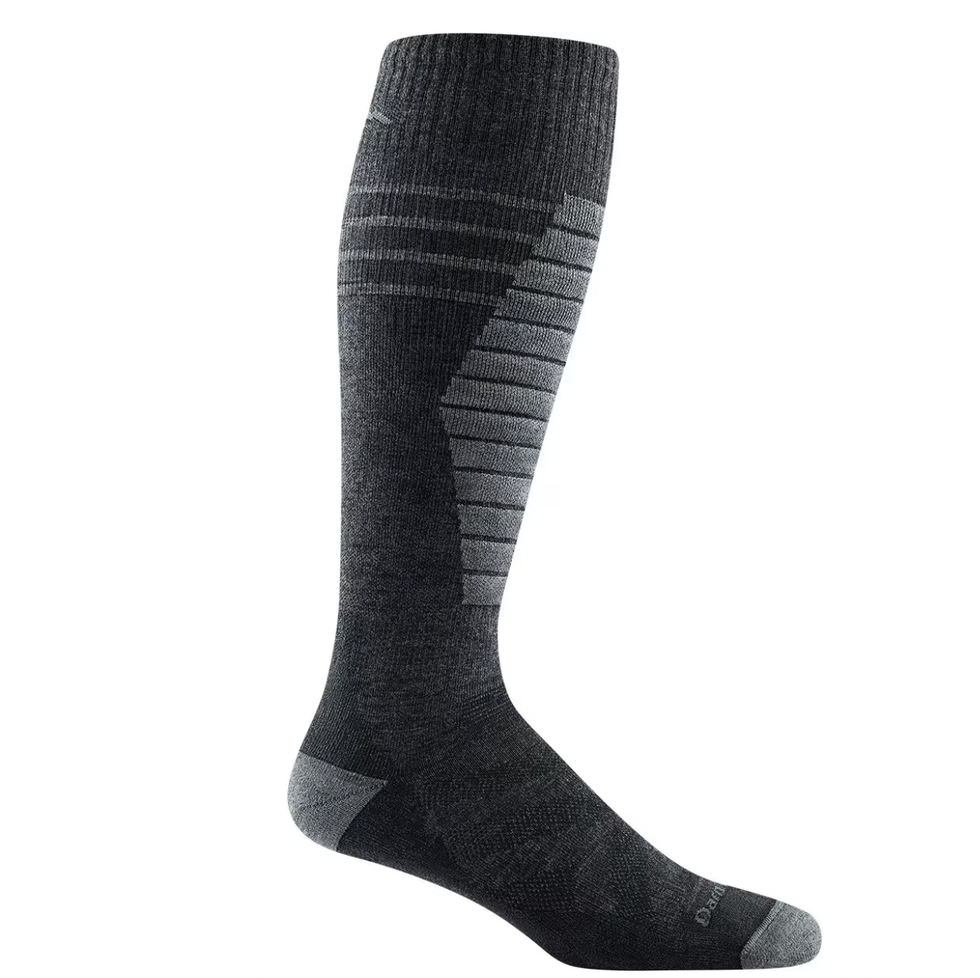
Best Compression Socks for Skiing
Darn Tough Edge OTC Midweight Sock
Pros
- Odor-resistant
- Ideal padded design for skiing
- Drys quickly
- Temperature-regulating
Cons
- Not ideal in warmer climates
Whenever we hit the slopes, we make sure these Darn Tough socks are in tow. They’re padded and snug in all the right places, with strategic protection along the shin and compression through the midfoot, ankle, and up into the calf muscle. The padded areas, along with the rest of the sock, really are “darn tough”—we’ve washed and worn a single pair dozens of times, and they’re still kickin’.
For getting active in cooler weather, you just can’t beat Merino wool, either. These aren’t too thick, wick away moisture well, and are naturally temperature-regulating and odor-resistant.
| Compression level | Medium |
|---|---|
| Cut | Knee-high |
| Material | 54% Merino wool, 43% nylon, 3% Lycra spandex |
| Fits shoe sizes | 8 – 14.5 |
Best Splurge Compression Calf Guards
2XU Non-Stirrup Compression Calf Guard
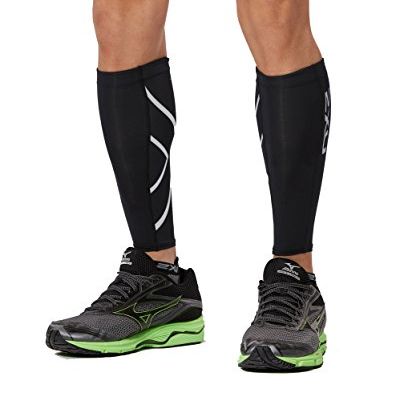
Best Splurge Compression Calf Guards
2XU Non-Stirrup Compression Calf Guard
Now 10% Off
Pros
- Lightweight and breathable
- Won’t slip
- Quick-drying
- Reflective safety detail
Cons
- Expensive
- Must be worn with a separate pair of socks
When it comes to style, we think calf guards rank among the most badass running gear. These sleek, lightweight nylon-Lycra fabric guards have sports-reflective graphics, which add to that cool factor, and make them a functional safety choice for running after dark.
They’re breathable enough to wear in the hottest weather and won’t slip even on your sweatiest runs. The 360-knit construction delivers pressure all around, and while we rank its compression right in the middle of the range, they’re pretty tight at first. Expect a few wears to break these in, and you might even want to size up if you aren’t used to compression gear.
| Compression level | Medium |
|---|---|
| Cut | Calf |
| Material | 72% Nylon, 28% lycra |
| Fits calf sizes | 14.5 – 17.75 inches (circumference) |
Best Compression Socks for Recovery
Shock Doctor Elite SVR Recovery Compression Socks
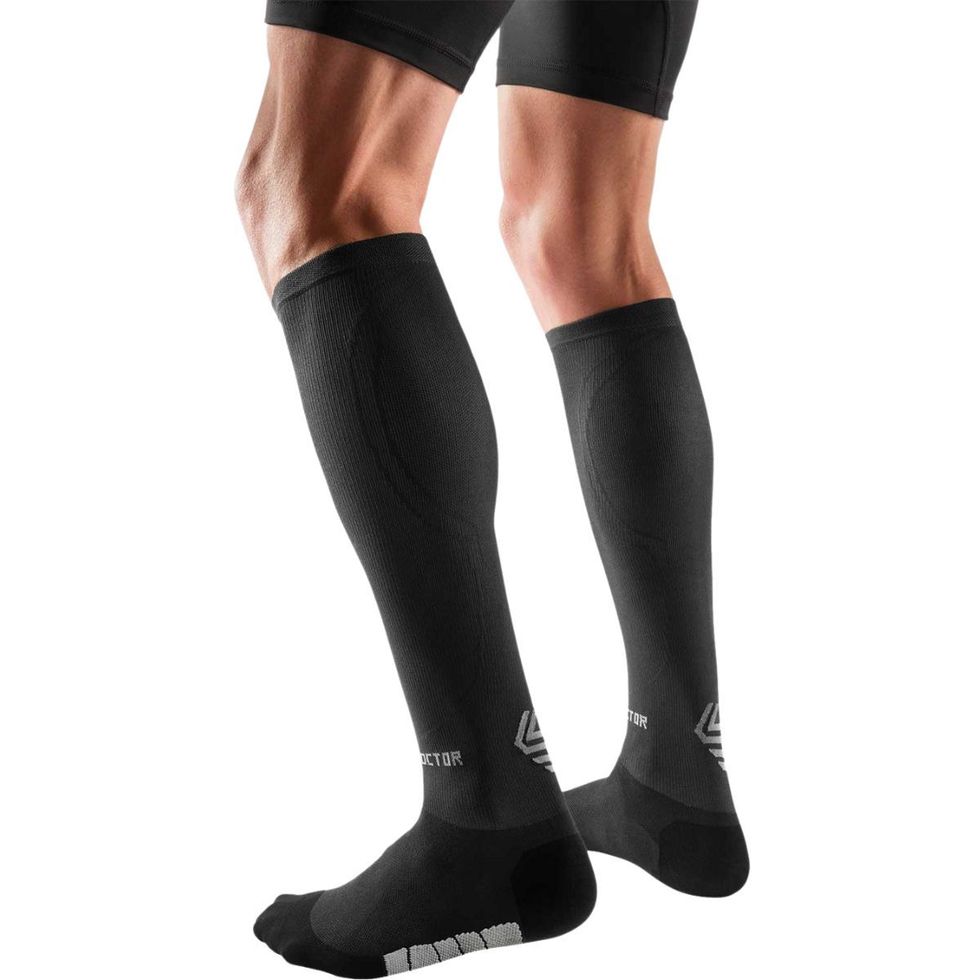
Best Compression Socks for Recovery
Shock Doctor Elite SVR Recovery Compression Socks
Pros
- Added footbed traction
- Offers targeted compression
- Antimicrobial
Cons
- Will run you a solid $50
Take a closer look at these Shock Doctor socks, and you’ll see the contoured knit texture. It’s not just for show—that contour allows for targeted compression in the areas that need more pressure like the ankles and calves. We also noticed that the compression is graduated, meaning the top of the sock won’t dig into your skin. Compression socks (especially those intended for recovery) should promote blood flow, not constrict it.
We also love that the footbed has a special design for added traction, so you can wear these around the house shoe-free after a run or workout without slipping and sliding.
| Compression level | Medium |
|---|---|
| Cut | Knee-high |
| Material | 46% tactel, 26% polyamide, 19% Timbrelle, 9% elastane |
| Fits shoe sizes | 5 – 11+ |
Advertisement – Continue Reading Below
Best Compression Crew Socks
Swiftwick Aspire Four
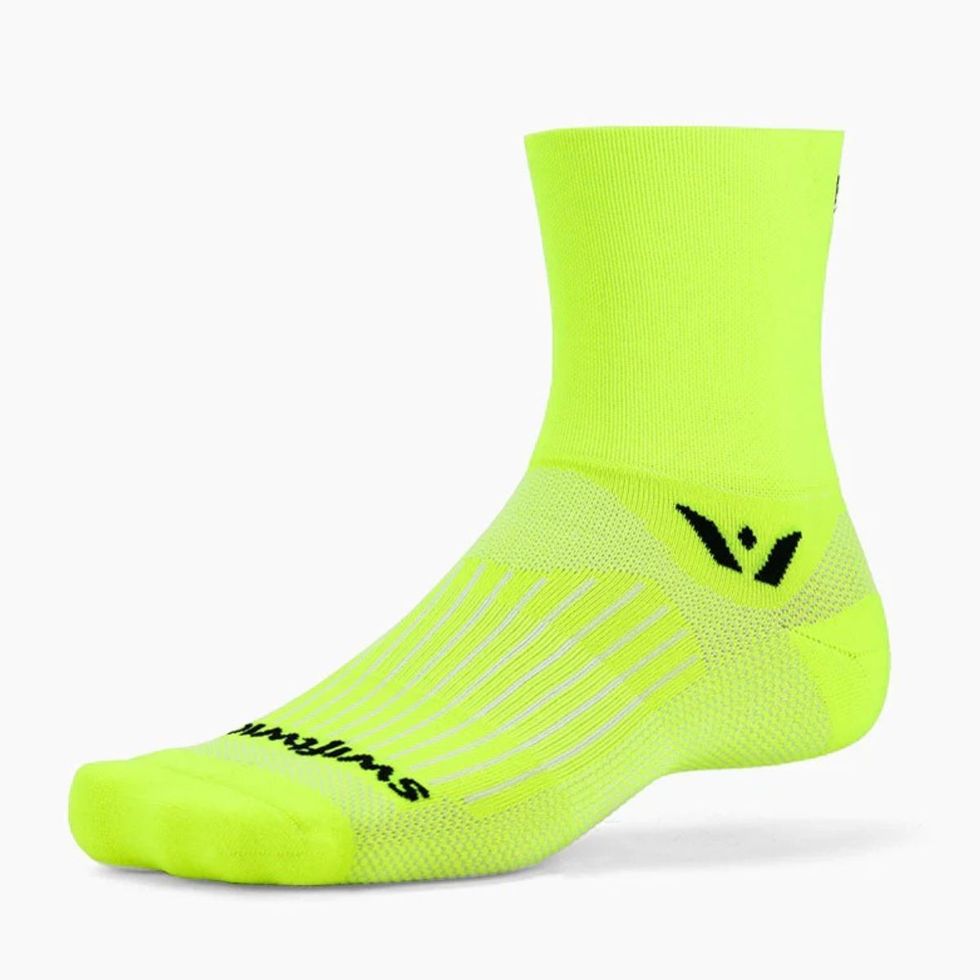
Best Compression Crew Socks
Swiftwick Aspire Four
Pros
- Reasonably priced
- Versatile crew cut
- Moisture-wicking
- Targeted compression through the foot
Cons
- On the thinner side (a pro for some)
Some cyclists and trail runners need a little extra compression throughout the foot or just don’t want a sock that comes all the way up to the knee. With firm compression in every contour of the foot and a classic crew cut, these are the socks for them.
The material is thin and breathable, with sweat-wicking qualities and a V-shaped heel to avoid bunching in your shoes. Plus, they’re pretty affordable at just under $20.
| Compression level | Heavy |
|---|---|
| Cut | Crew |
| Material | 67% Nylon, 28% olefin, 5% spandex |
| Fits shoe sizes | 3-15 |
Most Affordable Compression Calf Guards
Rymora Calf Compression Sleeve
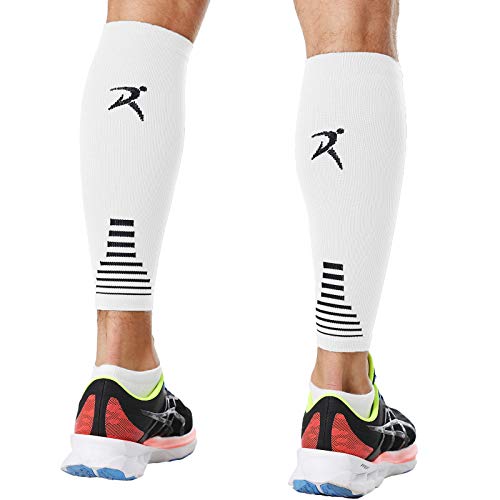
Most Affordable Compression Calf Guards
Rymora Calf Compression Sleeve
Pros
- Great price (and often on sale)
- Breathable
- Stays in place
Cons
- Must be worn with a separate pair of socks
These lower leg compression sleeves are made from a combination of nylon, polyester, and elastane that feels breathable, stretchy, and comfortable against the skin. At less than half the price of the 2XU calf guards, it’s impressive that we’ve also never struggled with these slipping during a run or workout.
The only downside from where we stand is that these run on the shorter side, meaning they won’t cover as much lower leg surface area as some knee-high options. Still, they’re a warm weather-friendly solution to calf compression.
| Compression level | Heavy |
|---|---|
| Cut | Calf |
| Material | 54% Nylon, 39% polyester and 7% elastane |
| Fits calf sizes | 10.5 – 21 inches (circumference) |
Best-Fitting Compression Socks
Feetures Graduated Compression Light Cushion Knee High Socks
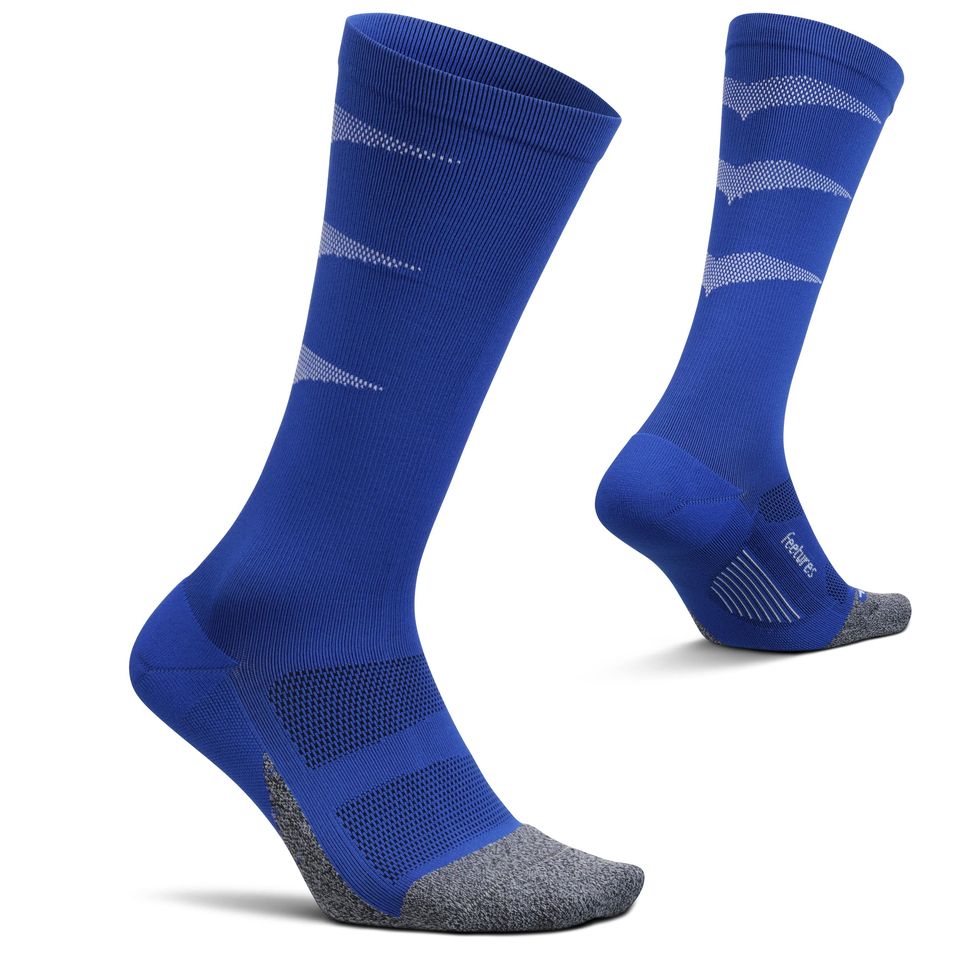
Best-Fitting Compression Socks
Feetures Graduated Compression Light Cushion Knee High Socks
Pros
- Targeted, graduated compression
- Premium construction
- Lightly padded
If you’re new to compression socks, Feetures might be a company that’s new to you. Even though the brand has flown under our radar for a bit, we’ve found that its compression socks offer a just-right fit that works for just about any sport or activity. It features (get it?) targeted and graduated compression, giving your feet, ankles, and calves a proper “hug” without squeezing them to death. Plus, the light cushioning adds extra comfort for all-day wear.
Like all the best compression socks with a premium design, these are a little pricey at $40 per pair. But, given the amazing fit, we think it’s worth the splurge.
| Compression level | Medium (15-20 mmHg) |
|---|---|
| Cut | Calf |
| Material | 87% Nylon, 13% Spandex |
| Fits calf sizes | 9.5 – 20 inches (circumference) |
Advertisement – Continue Reading Below
Best Budget Compression Socks
Dickies Light Comfort Compression Over-The-Calf Socks
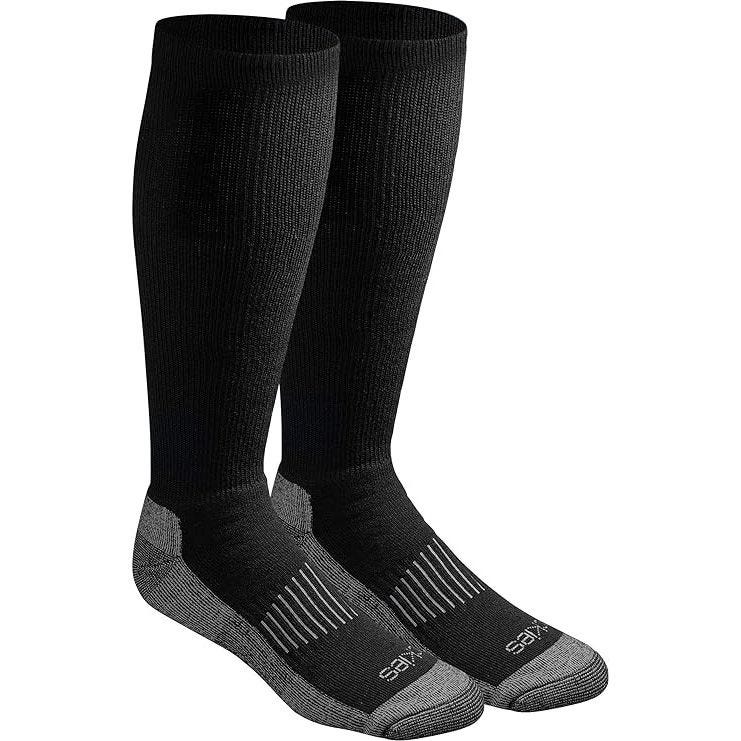
Best Budget Compression Socks
Dickies Light Comfort Compression Over-The-Calf Socks
Pros
- Great price
- Light compression great for everyday wear
- Full cushioned footbed
For basic, everyday wear, a light compression calf sock is almost always your best bet. This simple over-the-calf sock from Dickies are a solid, affordable option. The graduated 8-15 mmHg compression is just right for more relaxed days or even travel days when you’re not planning to be super active.
The design is a little bland, and the feel isn’t the most premium. But what sets it apart is the price. At just under $12/pair, it’s some of the most affordable compression socks we tested this year.
| Compression level | Light (8-15 mmHg) |
|---|---|
| Cut | Calf |
| Material | 86% Polyester, 13% Nylon, 1% Spandex |
| Fits shoe sizes | 5 – 15 |
Best Amazon’s Choice Compression Socks
Goldtoe Mild Compression Over The Calf Socks (3-Pairs)
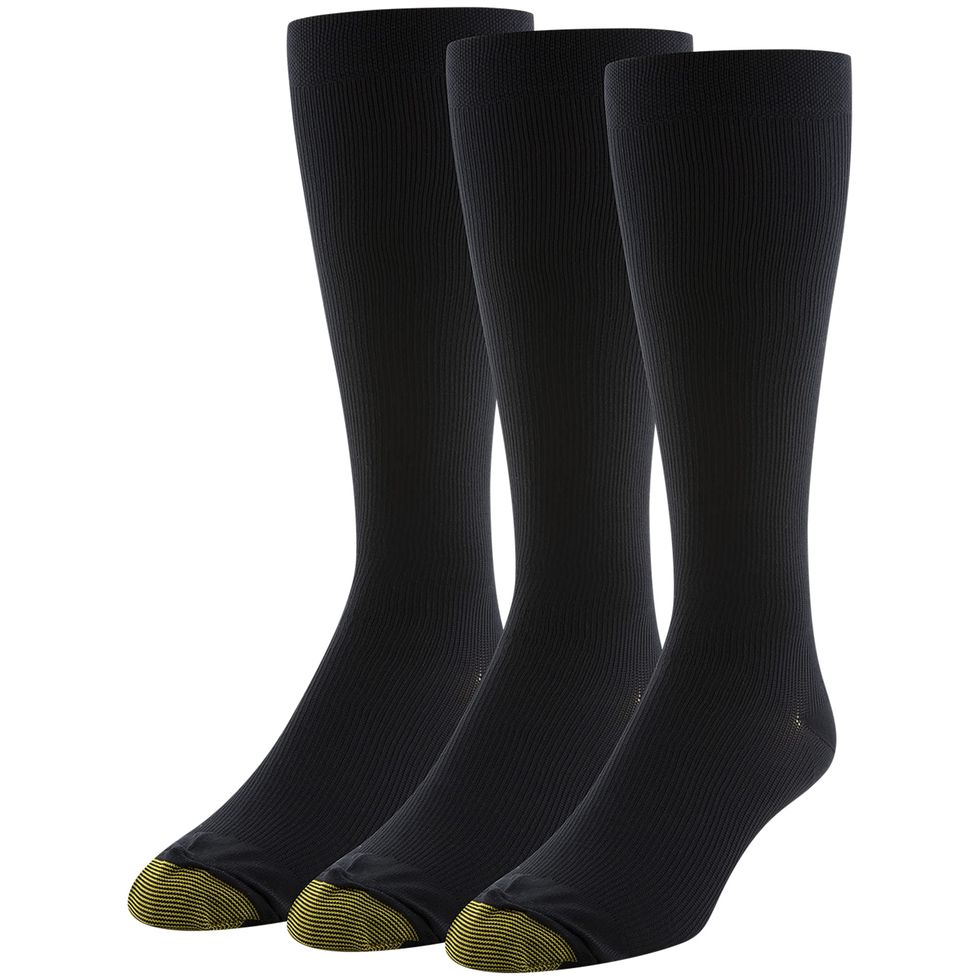
Best Amazon’s Choice Compression Socks
Goldtoe Mild Compression Over The Calf Socks (3-Pairs)
Now 26% Off
Pros
- ‘Amazon’s Choice’ buy
- Incredible price (less than $5 per pair!)
- Moisture-wicking
Cons
- Durability could be better
Goldtoe’s been a go-to sock brand for the better part of a century. If you’re looking for a staple, everyday-wear compression sock, this is a great buy. It offers some of the lightest compression of any in our roundup for a mild “squeeze” that’s comfortable enough to wear all day.
It isn’t the overall best or the most premium compression sock of 2023. But it’s great for ordinary, non-workout/recovery days, and you can’t beat the price. Less than $5 per pair? Sign us up!
| Compression level | Light |
|---|---|
| Cut | Calf |
| Material | 97% Nylon, 2% Spandex, 1% Polyester |
| Fits shoe sizes | 6 – 12.5 |
Best Basic Compression Socks
Amazon Essentials Graduated Compression Over-The-Calf Cotton Socks (3 Pairs)
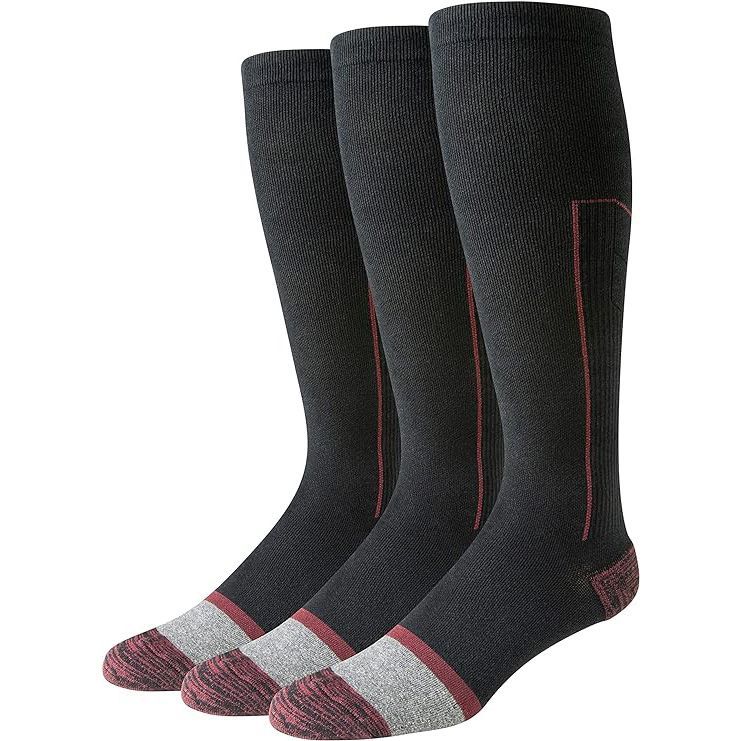
Best Basic Compression Socks
Amazon Essentials Graduated Compression Over-The-Calf Cotton Socks (3 Pairs)
Pros
- Light, just-right compression for daily wear
- Great price
- Reliable construction
Cons
- Not the most premium compression socks
When you want no-frills products for the cheapest price possible, Amazon Essentials delivers. Its Graduated Compression Over-the Calf-Cotton Sock isn’t fancy or flashy. But it delivers a just-right compression that’s graduated from the foot to the ankle and up the calf. Combined with zoned cushioning and moisture-wicking fabric, it’s a solid buy for keeping your feet cool, dry, and comfortable while promoting blood flow.
But the best part—as with all Amazon Essentials gear—is the price. It will set you back less than $5 per pair, making it one of the most affordable-yet-decent compression socks of 2023.
| Compression level | Light |
|---|---|
| Cut | Calf |
| Material | 89% Cotton, 8% Elastane, 3% Nylon |
| Fits shoe size | 6 – 12 |
Advertisement – Continue Reading Below
How To Choose the Right Compression Socks

The two most common compression sock measurements are 20-30mmHg and 15-20mmHg. The lower number at the front of each mmHg reading typically indicates the pressure on the top of the sock, while the higher number indicates the pressure on the foot of the sock. And in terms of overall mmHg ratings, the higher the number the stronger the compression.
Read more: Best Running Socks
For a 20-30mmHg compression sock, you can expect moderate to strong compression. This compression level is good for various sports and activities. There are compression socks higher than 20-30mmHg, but once you go past this level you’re getting into socks that are prescribed by doctors and for medical purposes.
A 15-20mmHg compression sock is better for everyday wear and for travel. You’re still going to get strong compression but it’s going to be nowhere near a 20-30mmHg fit. If you’re just starting in buying compression socks, it’s probably best to check out a 15-20mmHg pair first and see if you like the fit.
Can Compression Socks Really Improve Performance and Recovery?

Although the jury is still out on whether compression garments can actually improve your workout or decrease risk of injury, some of them offer enough compression to keep your muscles supported and contained, thus possibly improving circulation by squeezing blood back toward the heart, according to Dr. Miranda-Comas. And, from the anecdotal experience of some of us here at Men’s Health, we’ll vouch for the fact that a solid pair of compression socks can help you feel your best for a long run, work day, or travel day.
The biggest potential benefit of compression socks is the fact that they can help you recover faster by promoting the flow of blood back to the heart. One 2021 study found that wearing compression socks proved beneficial for adults who typically engage in minimal exercise (less than 60 minutes per week). It aided them in adhering to exercise routines and experiencing reduced soreness during the recovery phase. Another study found that runners who wore compression garments may also benefit from improvements in endurance performance, as well as reduced muscle pain, damage, and inflammation.
How Often Can Compression Socks Be Worn?

You can totally rock compression socks for hours on end, especially when you’re sitting down. It’s like a little leg-hug that helps with blood flow. They’re generally safe for most folks to wear every day, just make sure you get the right size to avoid discomfort.
But here’s the thing: Take them off from time to time to give your legs and feet a break. AKA don’t snooze in them or wear them around the clock. Compression offers a ton of benefits but can lose its value (and irritate your skin) when overdone.
Oh, and remember, compression socks aren’t immortal. After about three to six months of regular wear, those elastic fibers start to call it quits, and your socks won’t work their compression magic as well. If you’re ever unsure about how long or how often you should wear these leg-huggers, your best bet is to chat with a healthcare pro.
Advertisement – Continue Reading Below
Why You Can Trust Us

At Men’s Health, we take great pride in providing our readers with reliable and trustworthy product recommendations. We believe that our readers deserve the best, which is why we always make sure to conduct thorough research and testing before making any recommendations. For this story, we spent hours researching the top-rated compression socks on the market. Over the course of the past year, MH editors and experts tested and evaluated a total of 26 pairs of the best compression socks. We also interviewed experts including Dr. Gerardo Miranda-Comas, a sports medicine physician and assistant professor at the Icahn School of Medicine.
Our writers and editors are also experts in their own right, using their informed opinions to select products and ensure that our content is of the highest quality. Our recommendations are purely editorial, and while we may receive free products to test and review, we only recommend the products we are most impressed by. We never let retailers or public relations contacts dictate our content or product coverage, which is why you can trust us to provide you with reliable and unbiased product recommendations.
How We Selected the Best Compression Socks

To accurately test the top-rated compression shorts on the market, our team of fitness and health editors took many of these out for a spin for long days standing, short and long distance runs, cycling, and travel days. We paid close attention to evaluate their compression level, comfort, breathability, and price point. We also considered top-reviewed compression socks that were recommended by trusted fitness trainers and experts we consulted for this story.
John Thompson
Gear and Commerce Editor
John Thompson is the Gear and Commerce Editor at Men’s Health, where he covers fashion, grooming, gear, and technology. He was previously the Style & Gear Editor at BroBible.com, and a commerce writer for TheManual.com. His interests include attending concerts, spending time outside, and following his favorite baseball team, the Kansas City Royals.
Fitness and Commerce Editor
Talene Appleton is a fitness and food writer and editor, certified personal trainer (NASM-CPT), and former professional dancer based in New York City. Passionate about both exercise and cuisine, she merges her fitness, nutrition and culinary expertise with the goal of motivating others to embrace balanced healthy living. Her work has appeared in Men’s Health, General Surgery News, The Food Institute, The Nessie, and more.

